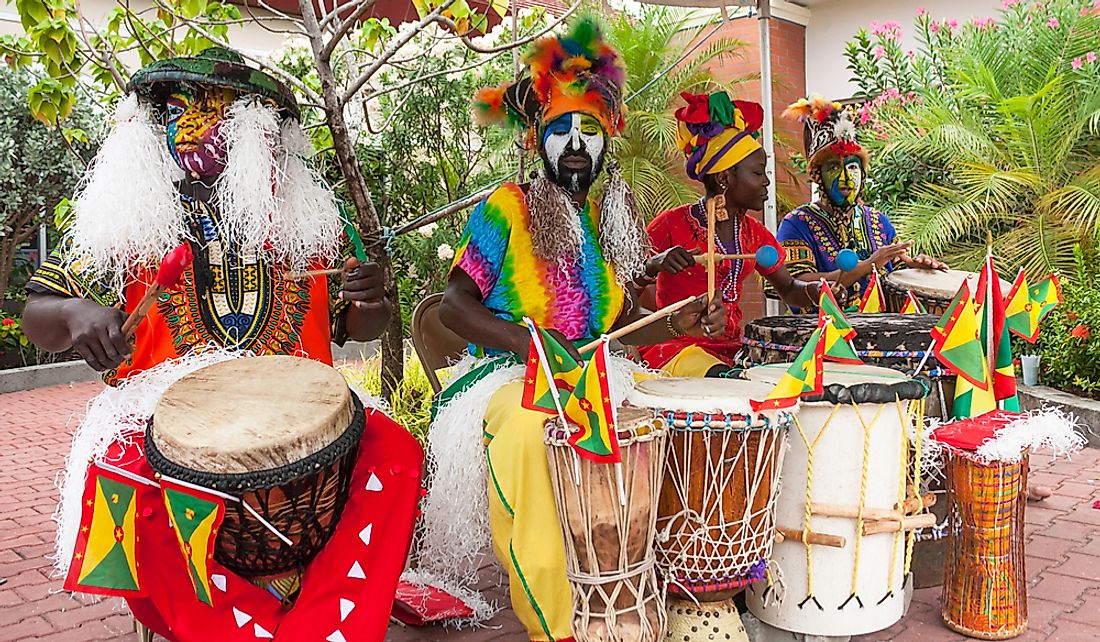The Culture Of Grenada

Grenada is a Caribbean island country in the West Indies. It includes the main island of Grenada and six smaller islands to the north of this island. The culture of Grenada is heavily influenced by French culture. Place names and surnames in French are common in the country. The everyday language of the people is also laced with French words. African and Carib Amerindian roots of its population also influence the Grenadian culture.
6. Ethnicity, Language, and Religion in Grenada
Grenada is home to a population of around 112,207 individuals. Individuals of African descent account for 82.4% of Grenada’s population. Those of mixed descent and East Indians comprise 13.3% and 2.2% of the country’s population respectively. English is the official language of Grenada. French patois is also spoken widely. 49.2% of Grenada’s population adhere to Protestant Christianity. Roman Catholics account for 36% of the population. Other Christian denominations are also active in the country.
5. Grenadian Cuisine
The cuisine of Grenada reflects the country’s cultural diversity. Oil Down is regarded as the country’s national dish. It is a wholesome meal consisting of coconut milk, breadfruit, dumplings, taro leaves, and salted beef or fish. The meal is cooked in a large pot called karhee or curry pot. Callaloo soup is a soup made of a leafy green vegetable called callaloo. Rotis or flour skins/wraps are filled with vegetables, meat, fish, or curried chicken and are often eaten for lunch or dinner. Cou cou pois is another popular Grenadian dish. It is made of vegetables and corn flour cooked slowly to produce a stiff and smooth ball. It is served with chicken or fish dish. Fried bake and saltfish souse, curry goat, and pelau are other dishes widely consumed in the nation.
Coconut drops (cookies made with grated coconut, butter, sugar, flour, and egg), nutmeg ice cream, fudge, sweet potato pone (a sweet potato pudding), etc., are most widely consumed desserts of Grenadian cuisine. Rum and beer are popular alcoholic drinks in the country.
4. Literature and the Arts in Grenada
With its population’s African roots, storytelling has been an important tradition in Grenada. Folktales and legends were passed down through the generations via this oral tradition. Grenadian written literature, however, has a more recent history. It emerged in the second half of the 20th century with the spread of education among the country’s population. Wilfred Redhead, a short story writer, Ricardo Keens-Douglas, a children’s writer, and F.M. Coard, a dialect poet were among Grenada’s most celebrated writers of the 20th century. Grenadian literature experienced a major development during the Grenada Revolution. Nationalist literature emerged during this time. Today, the country’s literature is still evolving. Events like Poetry Slam and Spice Word Literary Festival are helping encourage the writers further.
3. Performance Arts in Grenada
The African and Carib-Amerindian heritage of the Islanders has influenced Grenada’s performing arts scene. Reggae, jazz, soca, Calypso, etc., are some of the country’s most popular genres of music. African dances introduced in the country have evolved over the years. European dances like quadrilles and picquets have also shaped the Grenadian dances. Today, some of the most popular dances on the islands are Carriacou Big Drum, Heel-and-Toe, and Quadrille.
2. Sports in Grenada
Like other Caribbean cultures, cricket is Grenada’s most popular sport. It is played both professionally and informally throughout the nation. Cricket matches attract massive crowds and serve as a great source of entertainment for people of all ages. The players of Grenada’s national cricket team also play in the Windward Islands cricket team. Domestic and international cricket matches are hosted at the Grenada National Cricket Stadium. Grenada’s athletes have also participated in every Summer Olympics since 1984. In 2012, Kirani James won the first gold medal for the country in men's 400 meters.
1. Life in the Grenadian Society
The traditional Grenadian society was patriarchal in nature. Gender roles were well-defined. Today, however, many Grenadian women are educated and employed. They constitute a significant percentage of the workforce. However, some traditional duties are still expected to be executed by women. Employed or not, they are expected to complete the household chores and manage children. Working men, however, usually do not participate in household duties.
Household sizes vary in Grenada from large, extended rural families to nuclear families in the congested cities. Children are primarily raised by the mother but other family members and even the community participates in their upbringing and engage in teaching them social values and etiquettes. Inheritance is usually patrilineal in Grenada. Men inherit the wealth of their father and are responsible for providing for their own family.
Education beyond the primary level is accessible to only a select few who can afford the expenses of a university degree. Scholarships are given out to exceptional students from poorer backgrounds to ensure they can continue their studies.
Grenadians are very social in nature. They love to get together with friends and family to discuss the day’s proceedings or family life. Grenadians are also great hosts. Guests are welcomed with food and drinks and offered a place to rest.











